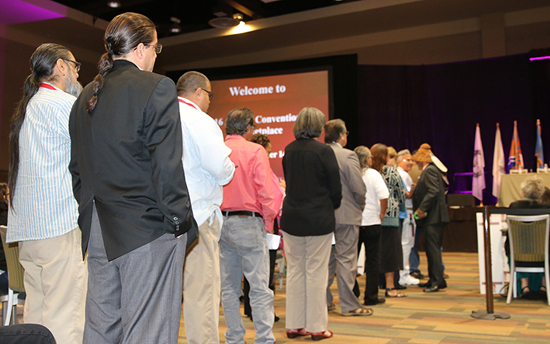
By Courtney Columbus and Andres Guerra Luz | Cronkite News
Lake Michigan to Catherine Hollowell and her tribe isn’t just a vital source of clean water.
It’s a reservoir of stories explaining how the Sault Ste. Marie Tribe of Chippewa Indians learned how to fish from the spider families. It’s a connection to gill net fishing – a tradition predating contact with European settlers. It’s a source of the tribe’s traditional knowledge, ecological knowledge, and customary ways of life. And to Hollowell it’s worth standing in line for several hours to voice her concerns about the pipeline system that threatens it.
Tribal leaders, like Hollowell, from across the U.S. convened at the Phoenix Convention Center this week to share their concerns with federal officials about the need for greater tribal input in advance of infrastructure projects, such as building or maintaining pipelines and roads. The leaders also shared their ideas for how the process could be improved.
A panel of federal officials spent about four hours – twice the scheduled time – listening to the concerns and suggestions that tribal leaders provided. The event took place at the site of the National Congress of American Indians’ 73rd Annual Convention and Marketplace in Phoenix and comes amid protests against the Dakota Access Pipeline in North Dakota where about 2,000 Native Americans have been camped.
Leaders of tribes from Arizona, Michigan, Indiana, California and others spoke during the session.
“Tribes more often than not get lost between the cracks when federal policy is being implemented,” said Stephen Lewis, governor of the Gila River Indian Community. “For there to be meaningful consultation, it has to happen at the beginning of the process,” he said. “Not at the end.”
Lewis talked about his opposition to the Arizona Department of Transportation Loop 202 project that would cut through South Mountain and affect the environmental health and prayer practices of his community, he said.
Hollowell said Standing Rock’s activism has set a precedent for other tribes’ concerns about similar projects to be heard more loudly.
“The executive office of President Obama has stepped in to give us this opportunity to have these discussions before they issue a permit that would allow that pipeline in North Dakota to go under the water,” Hollowell said. “That’s hopeful for us.”
Some leaders waited more than three hours for their turn at the microphone, standing in line for much of that time. Some leaders spoke with emotion while others were more subdued.
Tribes appreciate discussions like the listening session, Hollowell said, but what they really want is to be consulted before agencies move forward with projects, such as the pipeline, that affect their communities.
“Consultation is all well and good,” Hollowell said. “But what we’re looking for is prior informed consent.”
Hollowell and leaders of nearby tribes worry that a pipeline owned by Enbridge, a Canadian company, could leak and damage their traditional fishing waters.
In contrast to the Dakota Access Pipeline, which is under construction now, the Enbridge pipeline was built in the 1950s, before the Clean Water Act of 1972 added more pollution controls to existing environmental law.
The pipeline will be the subject of a risk analysis study funded by Enbridge that is expected to cost more than $3.5 million. In August, Michigan Attorney Generall Bill Schuette accused the company of failing to meet safety standards.
Line 6B of the pipeline burst in 2010, causing the largest inland oil spill in U.S. history. Cleanup of the spill had cost $1 billion and was still ongoing, according to a July 2015 report by Michigan officials.
Federal agencies have planned seven tribal consultations across the U.S. during October and November in the hopes of improving the consultation process.











